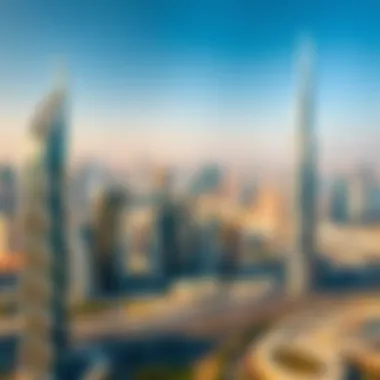Insights into Dubai's Real Estate Sales Trends


Intro
Dubai's real estate market is akin to a sprawling tapestry, rich with colors, textures, and intricate patterns weaving together under the influence of several dynamic forces. As a global hub for business and tourism, the city attracts a diverse pool of investors and homebuyers, each with their unique motivations and challenges. Understanding this complex environment requires more than just numbers; it demands a keen appreciation of behavioral economics, market sentiment, and socio-political contexts that shape decision-making processes.
When you look closer, the trends in Dubai’s real estate sales tell a compelling story of a market that refuses to be pigeonholed. Prices, for instance, do not simply rise or fall based on supply and demand; they are impacted significantly by fluctuations in international tourism, foreign investment regulations, and even the global economic landscape. If you’re contemplating entering this arena—be it as a buyer, seller, or investor—it’s prudent to gather insights that can help illuminate your path.
With this article, we aim to offer a comprehensive guide, navigating through the current market trends, essential steps in buying and selling, and key neighborhood insights. This journey will not just arm you with knowledge; it will prepare you to make informed choices in one of the world’s most vibrant real estate sectors.
Let's dive into the first crucial aspect: the property market overview.
Preamble to Dubai's Real Estate Market
Dubai’s real estate market is often described as a vibrant tapestry woven from diverse threads—each representing different aspects of this unique landscape. Understanding this market is pivotal not just for those with an eye on investment opportunities but also for buyers, sellers, agents, and developers. With its luxurious skyline, extensive developments, and a steadfast influx of residents and investors, Dubai stands out in the global real estate arena.
The importance of this topic lies in grasping the architectural evolution, social dynamics, and economic forces that shape the buying and selling processes within this bustling city. As potential investors or interested parties delve into Dubai's real estate realm, they benefit from an insightful exploration of historical trends, current market conditions, and foreseeable shifts in demand and supply. Additionally, recognizing buyers' preferences and market regulations can lead to more informed decisions.
A holistic view of the subject equips stakeholders with the knowledge required to navigate complexities. Whether it’s identifying lucrative residential properties in the ever-expanding neighborhoods or understanding the nuances of commercial real estate ventures, a deep dive into the market prepares individuals for what lies ahead. Moreover, it sheds light on future developments and trends that can make or break investment potential.
Understanding the intricacies of Dubai's real estate enhances your ability to make strategic choices in a competitive environment.
Given the world’s constant evolution and the unexpected twists that accompany real estate, staying updated on Dubai’s market trends not only broadens individual horizons but also helps pinpoint emerging opportunities. In the following sections, we will dissect Dubai's real estate ecosystem from its historical roots to the current status and projected growth, ensuring every reader walks away equipped with the essential insights needed to thrive in this captivating market.
Historical Overview of Real Estate
Diving into the history of Dubai's real estate reveals a narrative shaped by vision, innovation, and dramatic transformation. From its humble beginnings as a port town reliant on pearl diving in the 19th century to its current status as a major global city, Dubai’s real estate landscape has undergone an extraordinary metamorphosis.
In the early years, real estate development was slow-paced, predominantly focused on aimed at catering to local needs. However, the policy shifts in the late 20th century, including the introduction of freehold property laws in 2002, marked the dawn of modern real estate. This pivotal change was a game-changer, allowing foreign investors to own property in specific areas, thereby igniting the market with diverse investment options.
Subsequent developments, including the iconic Burj Khalifa and Palm Jumeirah, not only established new architectural benchmarks but also attracted significant global attention. This attention sparked a flurry of investments and transformed the skyline dramatically. The global financial crisis in 2008 briefly halted growth, with property values plummeting, but a resurgence followed—with renewed investor confidence—culminating in booming developments and reviving the once-burgeoning market.
Current Market Status and Growth
Presently, Dubai's real estate market is showing positive signs of growth, supported by a robust economy and a steady influx of expatriates. The market shows resilience and adaptability, shifting in response to market demands and economic environments. Recent data indicates increasing property sales, particularly in the luxury segment, reflecting high demand and strong buyer interest.
Key factors, such as the upcoming World Expo 2020 and ongoing infrastructural improvements, are highly influential. The Expo has generated excitement, not only drawing tourists but also investors curious to explore the region's potential. Increased government initiatives aimed at facilitating investments—like long-term visas for residents—further bolster market confidence.
Additionally, the introduction of smart city concepts continue to influence buyer preferences, leading to a notable interest in properties featuring sustainable designs and cutting-edge technologies. The projected growth in population resulting from urbanization underlines the potential for further expansion in real estate sales.
In summary, as we walk through the intricacies of Dubai's real estate market over the forthcoming sections, it becomes clear that this is more than just a place for property investment; it is a dynamic ecosystem influenced by historical context and propelled by current trends and future opportunities.
Key Drivers of Real Estate Sales
Understanding the key drivers of real estate sales in Dubai is crucial for anyone looking to make informed decisions in this dynamic market. Several elements influence these drivers, ranging from economic conditions to demographic shifts. Investors, buyers, sellers, and agents must grasp these factors as they can directly impact the value and demand for properties. This knowledge not only aids in investment strategies but also helps navigate the complexities of the market successfully.
Economic Factors Influencing Sales
Economic conditions underpin the whole real estate ecosystem, serving as the pulse of the market. In the UAE, factors such as GDP growth, inflation rates, and employment levels significantly affect buyer confidence and purchasing power. When the economy is thriving, there is generally a surge in demand for properties. In contrast, an economic downturn can create hesitation among potential buyers and reduce transaction activities.
Recent years have shown that Dubai's economy can be resilient even amid global challenges. For example, the country's diversification efforts away from oil dependency have led to a more stable employment landscape. The introduction of initiatives like the Golden Visa program has also made the city attractive to foreign investors, leading to increased sales of high-end properties.
Here are a few more economic factors:
- Interest Rates: Fluctuating interest rates impact mortgage affordability. Lower rates typically entice more buyers into the market.
- Foreign Investment: The UAE's liberal investment laws encourage international buyers to invest in Dubai's real estate, pushing sales up.
- Tourism Revenue: A robust tourism sector can stimulate demand for short-term rentals, driving the residential market.
Moreover, a robust infrastructure and ongoing government investment facilitate the growth of real estate, making it a lucrative area.
Population Growth and Urbanization
The steady rise in population combined with rapid urbanization is a game-changer for Dubai's real estate market. Dubai's appeal as a hub for businesses, lifestyle, and tourism sees its population swell, which creates an increased demand for housing. People from various backgrounds flock to the city for work and better living standards, pushing developers to build more residential and commercial spaces.
The following statistics highlight this trend:
- Population Growth: The population of Dubai is projected to reach over 3 million by 2027, enhancing the need for more accommodations.
- Urbanization Rate: With an urbanization rate exceeding 85%, most residents reside in urban areas, leading to a demand for better public amenities and housing.
This influx has led to a diversification of housing options ranging from luxury apartments to affordable housing, catering to a varied demographic. As the city's skyline continues to evolve, so does the architectural landscape, accommodating modern living needs while addressing sustainability and practicality. Citizens and expatriates alike are seeking not just houses, but homes within vibrant communities.
"In the heart of a thriving metropolis like Dubai, the landscape of real estate sales continually shifts, shaped by transient population trends and shifting economic tides."
Ultimately, understanding these key drivers ensures that investors and buyers can make decisions that align with market realities, enhancing their chances for success in this bustling real estate environment.


Investment Opportunities in Dubai
Dubai's real estate market presents a unique landscape for investors looking to dive deeper into property ownership. This section aims to highlight the different types of investment opportunities available in Dubai, and help potential investors make informed choices when navigating this bustling environment. The diverse options cater to varying preferences, budgets, and investment strategies. With a growing population and consistent economic growth, the UAE's favorable policies attract both local and international investors, making it a hotbed for property investment.
Residential Properties
Luxury Apartments
Luxury apartments in Dubai often embody opulence and comfort. They come with state-of-the-art amenities like private pools, gyms, and 24-hour concierge services. Investing in luxury apartments is seen as a popular choice for high-net-worth individuals, due to their potential for high rental yields and capital appreciation. A key characteristic of luxury apartments is their location; many are situated in prime areas like Downtown Dubai or along the Marina, providing stunning views and easy access to lifestyle amenities.
One unique feature of these luxury offerings is the emphasis on design and architecture, often crafted by leading international design firms. This flair gives them a competitive edge in the market. However, potential buyers should weigh the advantages against the high upfront costs and ongoing maintenance fees, which can be significant.
Villas and Townhouses
Villas and townhouses offer a different investment flavor in Dubai's real estate scene. They cater more toward families looking for space, privacy, and a sense of community. The suburbs are often dotted with these properties, offering quiet environments away from the bustling city center. Families particularly appreciate the outdoor spaces and gardens, making it a beneficial option for long-term living.
A defining feature of villas is the potential for customization and personal touch, which can enhance the property's value over time. However, investors need to consider the upkeep of larger spaces and the associated costs, which can quickly add up. In contrast, these properties generally have lower turnover rates compared to apartments, providing more stability in rental income.
Commercial Properties
Office Spaces
The demand for office spaces in Dubai has been influenced by rapid business growth. Companies, especially those in the technology and finance sectors, are keen to set up shop in prime locations. Investing in office spaces can generate solid returns, due to constant demand and a growing workforce. A standout characteristic is the modern infrastructure, designed to meet the needs of various businesses while ensuring a comfortable working environment.
However, the venturing into commercial real estate comes with its own risks. Economic fluctuations and shifts in market demand can congregate to create vacancies. Investors must also navigate long-term lease agreements, which can have their complexities but promise stable income if managed well.
Retail Outlets
Retail outlets in Dubai present a thriving opportunity for investors looking to tap into the consumer market. Given Dubai's status as a shopping haven, retail spaces—especially in malls—tend to attract a steady footfall. This demand increases the potential for high returns on investment. Notable features include extensive visibility and access, key aspects that contribute to retail success.
Investors should, however, be aware of the competition in the retail sector. The market can be highly dynamic, with trends changing rapidly. Investors must stay informed about customer preferences and market trends to capitalize on the potential of their retail investments. Additionally, consider the costs of managing and maintaining retail spaces, which are also essential to factor into profitability.
Understanding the nuances of each property type allows for strategic decision-making, helping investors maximize their returns while minimizing risks.
Regulatory Framework for Real Estate Transactions
Understanding the regulatory framework within Dubai's real estate market is critical. For potential buyers, investors, and even seasoned real estate agents, knowing how property laws and financial regulations operate can significantly influence decision-making. This framework not only protects buyers and sellers but also plays a vital role in the market's stability and growth.
Understanding Property Laws
Dubai's property laws are defined by various regulations that cover everything from ownership rights to property registration processes. One of the key elements is the Freehold and Leasehold distinction. In many areas, foreign investors can own property outright under freehold arrangements. This ownership can be a game-changer, enabling international buyers to enter the Dubai market with a strong footing.
On the other hand, leasehold properties allow ownership for a specific period—typically up to 99 years. This can be particularly appealing for developers and investors interested in long-term projects.
Another significant aspect is the requirement of property registration with the Dubai Land Department. Registration not only provides legal protection but also makes the transfer of ownership transparent and secure. Furthermore, the laws surrounding property disputes ensure that either party can seek resolution through a legal framework, making the investment environment safer.
- The Dubai Real Estate Regulatory Agency (RERA) operates under the umbrella of the Land Department, enforcing standards and providing oversight. Investors should familiarize themselves with RERA's regulations regarding pricing, contracts, and market conduct to avoid pitfalls.
Financial Regulations and Their Impact
Financial regulations deeply influence real estate transactions in Dubai. For one, the Real Estate Mortgage Law sets the stage for securing financing. Understanding these laws is essential for buyers looking to finance their property, as they dictate mortgage terms, repayment structures, and borrower responsibilities.
The Central Bank of the UAE plays a crucial role here, overseeing mortgage lending, implementing interest rate caps, and ensuring responsible lending practices. This level of oversight protects buyers and helps stabilize the market.
These regulations can create barriers, yet they also ensure that the market remains attractive to foreign buyers. For instance, non-residents can access mortgages, albeit under stricter conditions compared to Emirati citizens.
Also, investors need to consider the property transfer fees, which are typically settled at the time of purchase. Knowledge of these extra costs can prevent unpleasant surprises down the line.
"A clear understanding of the financial landscape can pave the way for smoother transactions and better investment outcomes."
Finally, as Dubai continues to innovate, regulatory bodies are increasingly adopting digital measures, such as e-registration and online notarization. Such advancements streamline the process and improve operational efficiencies, making it easier for buyers and sellers to navigate transactions in a transparent manner.
In summary, a solid grasp of the regulatory framework surrounding property transactions in Dubai is invaluable. It arms stakeholders with the knowledge to make informed decisions, foresee challenges, and leverage opportunities in one of the world's most dynamic real estate markets.
To dig deeper into Dubai's property laws, resources such as Dubai Land Department and Real Estate Regulatory Agency offer comprehensive insights.
Market Trends and Consumer Preferences
Understanding market trends and consumer preferences is pivotal for anyone involved in Dubai's real estate sector. This landscape is not static; it continually evolves, shaped by a myriad of factors ranging from economic conditions to cultural shifts. Analyzing these trends allows investors, developers, and agents to make informed decisions, optimizing their strategies to align with current consumer desires and needs.


One key aspect of this analysis is the adjustment to the shifting priorities of buyers. Trends in preferences not only highlight what the market currently values but also indicate where future opportunities may lie. Factors influencing these trends include technological advancements, sustainability concerns, and lifestyle changes due to global events such as the pandemic. Those who neglect to adapt might find themselves left in the dust.
Shifts in Buyer Demographics
In recent years, the buyer demographics in Dubai have undergone a significant transformation. Once primarily favored by wealthy expatriates and investors, there’s an increasingly diverse pool of buyers now entering the landscape. Young professionals seeking investment opportunities, families looking for spacious homes, and international buyers are all making their mark.
This shift brings forth various considerations:
- Age Dynamics: The buyers are getting younger. Millennial investors prefer properties that offer smart-home features and are eco-friendly. They're interested in how their living spaces reflect their values—something to keep in mind for new developments.
- Cultural Diversity: Dubai's melting pot of cultures results in varied property preferences. Understanding these nuances helps cater to specific groups. For instance, some communities prefer traditional architectural styles, while others lean towards modern aesthetics.
- Financial Reach: More financing options are available, making homeownership accessible to a broader audience. This rise means that developers must create offerings appealing to both luxury buyers and first-time homeowners.
"The more you know about your client's desires, the better you can tailor your offerings to meet them."
Emerging Property Types and Features
As we forge ahead, certain property types and features are making headlines and redefining the landscape. Buyers are not just looking for a place to live; they seek integrated communities that cater to a modern lifestyle.
Several trends are surfacing:
- Mixed-Use Developments: These spaces blend residential living with commercial facilities. Buyers appreciate the convenience of having shops, cafés, and recreational facilities within walking distance.
- Sustainable Features: Eco-friendly constructions are no longer a niche market. Solarpanels, energy-efficient appliances, and sustainable materials are becoming essential selling points as more people recognize their environmental impact.
- Work-from-Home Ready Spaces: The shift toward remote work has created a demand for spacious home offices. Properties that offer flexible spaces for work and leisure are highly sought after.
Understanding these emerging trends is crucial for anyone looking to invest in Dubai's ever-changing real estate market. By aligning property offerings with current demands, stakeholders can harness opportunities, driving success in their endeavors.
Challenges in the Dubai Real Estate Market
The Dubai real estate market, renowned for its soaring skyscrapers and luxurious living, faces significant challenges that could impact its future growth trajectory. Understanding these challenges is not only critical for investors and developers but also for current homeowners and potential buyers. This section delves into two primary issues: market saturation and economic uncertainties, which both pose considerable risks in this vibrant yet volatile environment.
Market Saturation and Its Consequences
With towering ambitions come the risks of oversupply. Dubai has experienced rapid development, leading to a real estate market featuring a plethora of residential and commercial properties. This surge in development raises alarm bells around saturation. When there are more properties than buyers, prices can dip, causing homeowners to face negative equity.
Consequences of saturation can include:
- Price Devaluation: As supply exceeds demand, properties may struggle to retain their value, putting sellers in a tight spot.
- Increased Competition: For realtors and developers, the competition to attract buyers can be fierce, forcing them to slash prices or cut back on services and amenities.
- Investment Hesitance: Potential investors may lose faith in the market, fearing that their investments will not yield satisfactory returns.
Thus, it becomes imperative for market players to keep an eye on inventory levels and consumer appetite to avoid falling into the saturation trap.
Economic Uncertainties and Risks
Economic fluctuations can wreak havoc in the real estate realm. While Dubai has historically shown resilience, the current global economic climate raises concerns. Factors such as changes in oil prices, fluctuating currency values, and political instability in the region can create a precarious situation.
Key risks linked to economic uncertainties include:
- Market Volatility: Investors are often wary during economic downturns, leading to a decline in transactions. A dip in consumer confidence can cause a ripple effect throughout the market.
- Financing Challenges: Unpredictable economic conditions can tighten lending requirements for banks, making mortgages harder to obtain, thereby limiting buyer access to the market.
- Employment Instability: A sluggish economy can result in job losses or reduced income levels. This translates to decreased purchasing power for potential buyers, further depressing demand.
"Navigating the Dubai real estate market requires not just insight into economic conditions but also an understanding of the local sentiment and buyer psychology."
In summary, the challenges of saturation and economic uncertainties must be considered seriously by anyone looking to venture into Dubai's real estate. Staying informed about these elements not only helps investors strategize effectively but also equips buyers with knowledge that could safeguard their investments. Understanding these challenges is pivotal for ensuring investment decisions are well-informed and adjusted to current market realities.
The Role of Technology in Real Estate Sales
In the rapidly evolving landscape of Dubai's real estate market, technology plays a pivotal role that cannot be overlooked. The integration of digital solutions not only enhances efficiency but also reshapes the way buyers and sellers interact. As we venture deeper into this topic, it becomes clear that the impact of technology extends far beyond convenience; it fundamentally transforms the market dynamics.
One significant aspect of technology in real estate is its role in streamlining processes. Traditionally, property transactions involve a myriad of paperwork and manual tasks. However, with the advent of digital tools, tasks like documentation, communication, and listings are being simplified. This digitization means less time wasted and more focus on the essential elements of buying and selling.
"Technology is not just a trend; it is the future of real estate."
Furthermore, technology enhances transparency in transactions. For investors and buyers alike, knowing that they have access to authentic and verified listings builds trust. This transparency is crucial in a market like Dubai's, where substantial investments are at stake. With the availability of online databases and platforms, it’s easier for potential buyers to verify ownership and understand property histories.
In the subsequent sections, we will examine the specific elements that highlight the significance of technology in this market, particularly focusing on digital marketing strategies and real estate platforms.
Digital Marketing Strategies
Digital marketing strategies have revolutionized the way real estate agents and developers promote properties. In a bustling metropolis like Dubai, standing out among the myriad of listings is essential. The deployment of targeted ads and social media campaigns allows sellers to reach the right audience effectively. Here are a few key strategies that have emerged:
- SEO-Optimized Content: Crafting engaging blog posts and property descriptions tailored to search engine algorithms improves visibility. By targeting keywords like "Dubai luxury apartments" or "affordable villas in Dubai," sellers can attract more traffic.
- Social Media Marketing: Platforms such as Instagram and Facebook are invaluable for showcasing properties through stunning visuals. Short video tours and live sessions can create buzz about new listings before they hit the market.
- Email Campaigns: Personalized communication through emails can keep potential buyers informed about new opportunities tailored to their preferences. Regular newsletters can maintain an ongoing relationship with clients.
Digital marketing not only accelerates property sales but also fosters engagement among potential buyers. It opens channels for feedback and inquiries, enhancing customer service.
Real Estate Platforms and Marketplaces


In today’s world, real estate platforms are crucial for both buyers and sellers. They serve as the digital backbone of the property market, hosting listings, facilitating communication, and providing valuable insights. Some notable platforms include Property Finder, Dubizzle, and Bayut. These sites bring together various stakeholders under one roof, which is beneficial for all.
Key features of these platforms include:
- Comprehensive Listings: Buyers can access a wide array of properties, complete with detailed descriptions, high-quality images, and virtual tours.
- User Reviews and Ratings: Feedback from previous clients gives potential buyers insights into the credibility of agents and developers. Trust is key in any transaction, especially in real estate.
- Market Analytics: Many platforms offer data on market trends, pricing, and neighborhood insights. Information like this arms investors with the knowledge needed for making informed decisions.
In summary, the role of technology in Dubai’s real estate sales can’t be overstated. From marketing strategies that speak to the audience's desires to platforms that simplify the transaction process, technology serves as both a driver and enabler in this vibrant sector.
Sustainability in Dubai Real Estate
Sustainability has become a cornerstone for the real estate industry, particularly in fast-developing markets like Dubai. The significance of sustainable practices in this context cannot be overstated, as they not only align with global environmental goals but also enhance the long-term viability of investments in the region. As the tide shifts towards environmentally friendly and socially responsible construction and operation of properties, investors, developers, and buyers alike must pay attention to this emerging facet of the Dubai real estate landscape.
Investing in sustainability often translates to financial benefits over time. Properties that focus on green practices tend to attract a more conscientious buyer base, which often is willing to pay a premium for the added value of sustainable design, lower operating costs, and reduced environmental impact. Enhancements in sustainability also improve the overall marketability of a property, giving it an edge in a competitive marketplace. The principles of sustainability interact with various aspects of real estate, from energy-efficient buildings to the responsible sourcing of materials.
Sustainable Practices in Construction
When looking closely at sustainable practices in construction within Dubai, several elements come into play. First and foremost is the incorporation of energy-efficient technologies. Builders are now increasingly focusing on installations such as solar panels, high-efficiency HVAC systems, and smart home technologies that manage energy consumption more effectively. These investments may yield initial costs, but they return savings on utilities and maintenance down the line.
Moreover, using sustainable materials is gaining traction. This encompasses materials that are either recycled or sustainably sourced, reducing the carbon footprint associated with logistics and production. For instance, bamboo, reclaimed wood, and low-VOC (Volatile Organic Compounds) finishes are becoming more prevalent in new constructions and renovations, fostering a healthier environment for occupants.
Additionally, green landscaping practices emphasize the importance of native plants that require less water and maintain biodiversity, contributing positively to local ecosystems. More advancements come through water management practices that help reduce consumption, like rainwater harvesting and efficient irrigation methods.
As a result, businesses that prioritize sustainable construction benefit not only the environment but also create spaces that resonate with the increasing consumer demand for eco-friendliness.
Green Certifications and Their Relevance
Green certifications have transformed the way properties are evaluated in the real estate market. In Dubai, certifications such as LEED (Leadership in Energy and Environmental Design) and Estidama are gaining footholds among builders and developers. These certifications provide significant benchmarks for assessing a project’s sustainability practices, encompassing energy use, indoor environmental quality, and environmental stewardship.
Obtaining a green certification often enhances a property's reputation, showcasing a commitment to sustainability that resonates with modern buyers and tenants. Properties with such certifications tend to sell or lease at higher rates due to their perceived value in lower operational costs and healthier living environments.
Furthermore, local government initiatives align with global standards, encouraging developers to adopt green practices. Incentives such as tax breaks or expedited permitting are often available to those who pursue green building certifications.
By prioritizing these certification programs, investors and developers position themselves for success while contributing to the broader goals of sustainability in the region, creating a win-win scenario for both economic return and environmental responsibility.
As the market continues to evolve, the emphasis on blended financial savvy with environmental considerations will likely dictate the direction of future developments in Dubai's real estate sector.
Future Outlook of Dubai Real Estate Sales
The future outlook of Dubai's real estate sales paints a vibrant picture, one that reflects the changing dynamics of investor interests and market adjustments. As the global economy shifts and local regulations evolve, understanding what lies ahead can equip stakeholders with the knowledge necessary to make informed decisions. Having a grasp on market forecasts and potential growth areas can shape investment strategies, guide property development, and prepare buyers for upcoming opportunities.
Market Forecasts and Predictions
The market forecasts for Dubai's real estate are marked by a mix of cautious optimism and strategic planning. Analysts predict a trend where real estate prices might stabilize after years of escalation, making it accessible to a broader range of buyers. For instance, according to data from multiple financial institutions, projections indicate a potential growth in property investment driven by the anticipated influx of international events and developments.
- Short-Term Forecasts: In the immediate future, the market may continue to see fluctuations. Developers and investors must stay agile, looking for chances in both residential and commercial components, adapting quickly to consumer demands.
- Long-Term Predictions: Over the next five years, a notable recovery in the market is expected, tapping into Dubai’s growing reputation as a business hub. The ongoing improvements in infrastructure and transportation will likely enhance property valuations.
The aging real estate stock could make newer, premium developments more appealing for foreign investment. Moreover,
"Technology integration into properties, such as smart home features, increasingly defines desirability among buyers," highlighting the shift towards modern, efficient living spaces.
Potential Growth Areas
Identifying zones primed for expansion is crucial for anyone involved in Dubai's real estate. The following areas are ripe for growth:
- Dubai South: This area, particularly with its proximity to the Expo 2020 site, has seen a surge in interest. Future residential projects here could benefit from sustained demand as new jobs come online and amenities develop further.
- Al Jaddaf: Known for a blend of residential and commercial projects, Al Jaddaf is appealing due to its central location. The influx of international firms looking to set up offices here adds another layer of investment allure.
- Dubai Creek Harbour: As a premier waterfront development, it has the potential to attract high-caliber investments. The unique vision of mixed-use spaces is set to elevate property values significantly.
- Dubai Marina: Always a favorite among locals and expats, the Marina's continuous appeal ensures it remains a sound location for future investments.
For investors, developers, and agents in the region, these insights into future trends can help navigate the intricate path that is the Dubai real estate market. Keeping an ear to the ground while being flexible in strategy will undoubtedly lead to better outcomes. Regularly checking reputable property market reports and official updates from the Dubai Land Department, as well as engaging with local real estate forums, can be beneficial in gathering timely information that informs investment decisions.
Culmination: Navigating the Dubai Real Estate Market
Navigating the Dubai real estate market requires a nuanced understanding of its intricacies. The diverse factors at play can significantly influence decisions for buyers, sellers, and investors alike. This conclusion synthesizes information from throughout the article, illuminating the vital elements to keep in mind when traversing this dynamic sector.
Dubai's real estate landscape is not just about transactions; it's steeped in cultural nuances, evolving regulations, and a constantly shifting economic backdrop. The importance of being informed cannot be overstated, as it opens doors to potential investments while minimizing risks associated with market fluctuations. Those who grasp the underlying economic forces tend to perform better in their transactions.
Key Takeaways for Investors
- Market Research is Essential: Understanding current trends, property types in demand, and buyer preferences equips investors with the necessary insight to make informed decisions.
- Legal Framework: Familiarity with property laws and regulations is crucial. Investors should stay updated on changes that could impact ownership rights or financial obligations.
- Technology’s Role: Leveraging digital platforms can enhance visibility and accessibility for potential buyers, making it easier to list properties and connect with interested parties.
- Economic Indicators: Keeping an ear to the ground for economic indicators provides vital context for investment timing. Factors such as population growth, urban development projects, and global economic trends can indicate market health.
- Diversification: Investing across various property types—residential, commercial, and rental—can help mitigate risks stemming from market volatility.
"In the world of real estate, knowledge is power—those who stay informed and adaptable are most likely to thrive in an ever-changing environment."
Final Thoughts on Market Dynamics
The dynamics of the Dubai real estate market remain intricate and, at times, challenging. Economic conditions, regulatory frameworks, and consumer preferences evolve rapidly, necessitating a proactive approach from market participants. Understanding these dynamics allows investors to anticipate changes and seize opportunities as they arise.
Being acutely aware of trends such as sustainability in construction and the digital shift in marketing could set you apart. Buyers are increasingly drawn to properties that offer not only luxury but also eco-friendliness and investment potential. As the world marches toward greater sustainability, properties that adhere to green standards will likely hold more value in the future.











